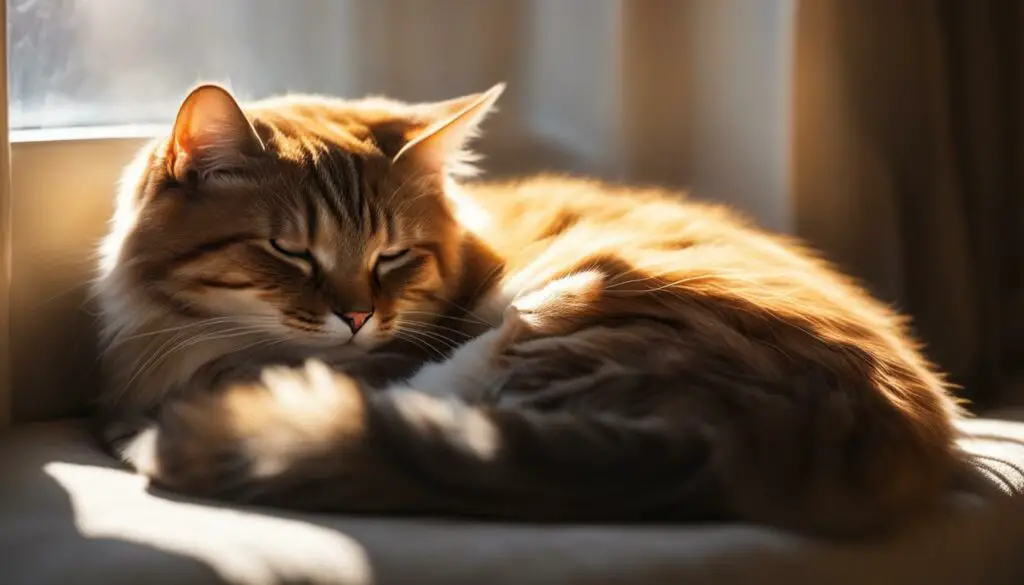As a cat owner, I’ve often wondered why my feline friend sometimes tenses up while sleeping. It’s a behavior that piqued my curiosity, so I decided to delve deeper into the fascinating world of cat behavior and muscles. In this article, I’ll explore the reasons behind this peculiar phenomenon and provide some insights into what might be causing your cat to tense up while catching those much-needed Z’s.
Key Takeaways:
- Cats may experience muscle tension while sleeping, and it’s more common during relaxed or deep sleep states.
- Possible causes of muscle tension in cats include stress, anxiety, fear, and environmental factors.
- Understanding the feline sleep cycle and the role of muscle tone can shed light on why cats tense up during sleep.
- Creating a calm sleep environment and implementing relaxation techniques can help alleviate muscle tension in cats.
- If you’re concerned about your cat’s muscle tension during sleep, it’s best to seek veterinary guidance for a proper diagnosis and treatment.
Common Causes of Muscle Tension in Cats
When it comes to the muscle tension that cats experience during sleep, there can be several common causes. One of these causes is relaxation. Just like humans, cats can tense up during deep states of relaxation. This is a natural response and usually nothing to be concerned about. However, if you notice excessive tension or discomfort, it’s important to investigate further.
Stress, anxiety, and fear are another set of common causes for muscle tension in cats. Changes in the environment, such as loud noises or unfamiliar surroundings, can trigger a cat’s fight or flight response and lead to muscle tension during sleep. It’s important to create a calm and safe environment for your cat to help alleviate these issues and encourage relaxation.
It’s worth noting that not all muscle tension during sleep is cause for concern. Cats may experience twitches or reflexive muscle movements during the REM sleep stage, which is associated with dreaming. These movements are normal and usually nothing to worry about. However, if you observe any abnormal or excessive muscle tension, it’s best to consult with a veterinarian to rule out any underlying health issues.
Understanding the Feline Sleep Cycle
During a cat’s sleep, they go through different stages that make up the feline sleep cycle. This cycle consists of two main stages, namely REM sleep and deep sleep. REM sleep, which stands for Rapid Eye Movement sleep, is associated with dreaming. During this stage, cats may exhibit twitches or involuntary muscle contractions. These twitches and contractions can be a reflexive response to the dreams or positions they are in during REM sleep.
REM sleep is often characterized by increased brain activity and rapid eye movements. It is believed that cats experience dreams during this stage, similar to humans. The twitching and contractions observed during REM sleep may be a physical manifestation of their dreams or the result of the cat’s subconscious responding to various stimuli.
Deep sleep, on the other hand, is a state of restorative rest where minimal muscle activity occurs. This stage is crucial for the cat’s physical and mental well-being. During deep sleep, the cat’s body is in a state of relaxation, allowing for cellular repair and replenishment of energy. It is during this stage that the cat’s muscles may tense up to maintain muscle tone and prevent muscle atrophy. However, excessive muscle tension during deep sleep can disrupt the quality of sleep and may indicate underlying discomfort or pain.
The Feline Sleep Cycle
To summarize, the feline sleep cycle consists of two main stages: REM sleep and deep sleep. During REM sleep, cats may exhibit twitches or involuntary muscle contractions, possibly in response to dreams or their positions during sleep. Deep sleep is a state of restorative rest where minimal muscle activity occurs. Understanding these stages can help us comprehend why cats may tense up while sleeping and the importance of maintaining a healthy sleep environment for our feline companions.
| Sleep Stage | Description |
|---|---|
| REM sleep | Associated with dreaming, increased brain activity, and rapid eye movements. Cats may exhibit twitches and involuntary muscle contractions. |
| Deep sleep | A state of restorative rest where minimal muscle activity occurs. Crucial for cellular repair and replenishment of energy. Muscle tension may occur to maintain muscle tone. |
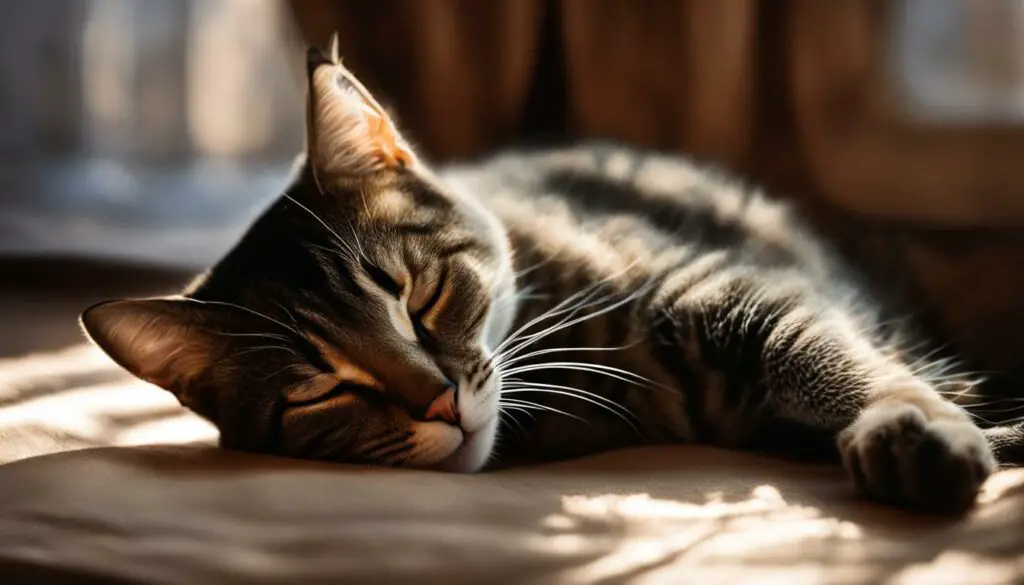
Understanding the feline sleep cycle can shed light on why cats may tense up while sleeping. By creating a sleep environment that promotes relaxation and taking note of any excessive muscle tension, we can ensure that our cats have a restful and rejuvenating slumber.
The Role of Muscle Tone in Sleep
During sleep, muscle tone plays a significant role in maintaining overall sleep quality for cats. It is a mechanism that helps ensure their muscles remain active and prevents muscle atrophy. However, excessive muscle tension during sleep can lead to sleep disturbances and may indicate underlying discomfort or pain.
When a cat tenses up while sleeping, it is their body’s way of maintaining muscle tone. This tension helps keep their muscles engaged and prevents them from becoming too relaxed or weak. It is a natural reflex that promotes physical well-being and allows cats to be ready for action when they wake up.
While muscle tone is essential for healthy sleep, excessive tension can disrupt sleep patterns and impact comfort. It is important to monitor your cat’s sleep and observe any signs of discomfort or restlessness. If you notice consistent muscle tension or signs of sleep deprivation, it is advisable to seek veterinary guidance to determine the underlying cause.
The Importance of Comfort for Sleep
Comfort plays a crucial role in a cat’s ability to achieve restful sleep. Creating a comfortable sleep environment can help alleviate muscle tension and promote better sleep quality. Consider factors such as the temperature, bedding, noise levels, and lighting in your cat’s sleeping area.
| Factors to Consider for a Comfortable Sleep Environment | Recommendations |
|---|---|
| Temperature | Maintain a moderate temperature in the room to ensure your cat is neither too hot nor too cold. |
| Bedding | Provide a comfortable and supportive bed or cushion for your cat to sleep on. |
| Noise | Minimize disruptive noises that could disturb your cat’s sleep, such as loud conversations or household appliances. |
| Lighting | Ensure the sleep area is dimly lit or dark to create a calm and peaceful atmosphere. |
By addressing both muscle tone and comfort, you can help optimize your cat’s sleep quality and contribute to their overall well-being and happiness.
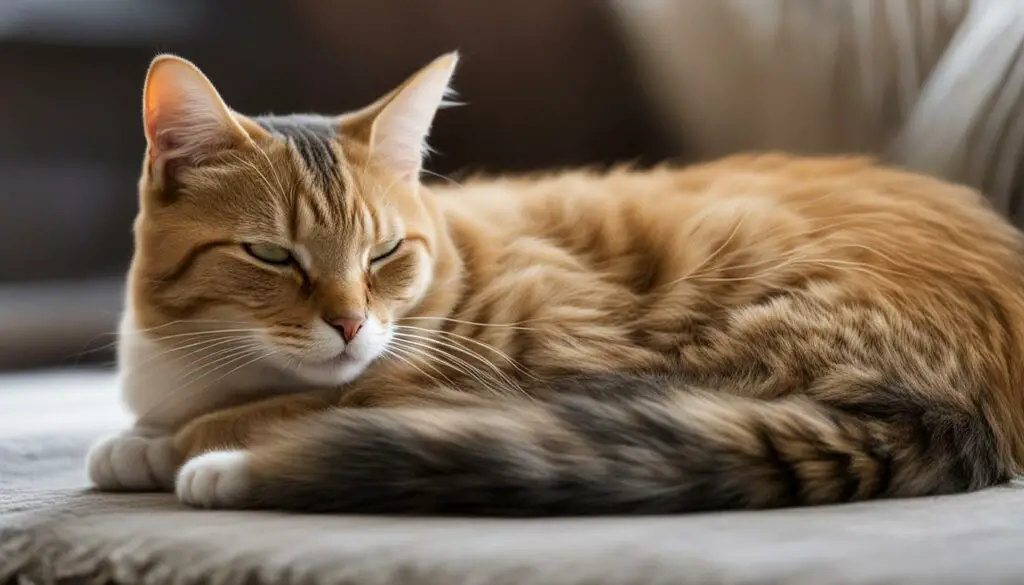
Environmental Factors and Muscle Tension
Environmental factors play a significant role in the muscle tension that cats may experience during sleep. Cats are instinctual creatures and are constantly aware of their surroundings, even when they are sleeping. Various elements in their environment can trigger their innate predator or prey instincts, leading to muscle tension.
Noise can be a significant factor in causing muscle tension during sleep. Loud sounds or sudden noises can startle a cat, causing them to tense up in response to the potential threat. It is essential to provide a quiet and peaceful sleep environment for your cat, minimizing any unnecessary noise that may disturb their rest.
Similarly, bright lights or excessive lighting can also trigger a cat’s instincts and cause them to tense up. Cats are naturally more active during the night and prefer dim lighting for sleep. Ensuring that your cat’s sleep area is adequately darkened can help reduce muscle tension and promote a more restful sleep.
| Environmental Factors | Effect on Muscle Tension |
|---|---|
| Noise | Can startle cats and cause them to tense up during sleep. |
| Light | Excessive lighting can trigger a cat’s instincts and lead to muscle tension. |
| Temperature | Extreme temperatures can cause discomfort and muscle tension during sleep. |
| Predator and Prey Instincts | Cats may naturally tense up during sleep as a response to potential threats or prey. |
Temperature is another environmental factor that can contribute to muscle tension in cats. Extreme temperatures, whether too hot or too cold, can cause discomfort and disturb a cat’s sleep. It is important to provide a comfortable and moderate temperature in your cat’s sleep area to help prevent muscle tension.
Understanding these environmental factors and their impact on muscle tension can help create a sleep environment that is conducive to relaxation and restful sleep for your cat. By minimizing noise, dimming lights, and maintaining a comfortable temperature, you can help reduce muscle tension and promote a more peaceful sleep for your feline companion.
Relaxation Techniques for Tense Sleeping
If you notice that your cat frequently tenses up while sleeping, there are several relaxation techniques you can try to promote better sleep and alleviate muscle tension. These techniques are designed to create a calm and soothing environment for your cat, helping them feel more at ease during their sleep.
1. Massage: Just like humans, cats can benefit from gentle massages. Use slow and gentle strokes to help relax their muscles and promote a sense of calmness.
2. Stretching: Encourage your cat to engage in gentle stretching exercises. This can help release tension in their muscles and promote relaxation before sleep. Provide them with safe and suitable spaces for stretching, such as scratching posts or designated play areas.
3. Meditation: Introduce calming and soothing elements to your cat’s sleep environment, such as soft music or nature sounds. This can help create a peaceful atmosphere and aid in relaxation for your cat.
By implementing these relaxation techniques, you can create an environment that helps your cat feel calm and secure while sleeping. It’s important to observe your cat’s response to these techniques and make adjustments based on their individual preferences and needs.
| Relaxation Techniques for Tense Sleeping | Description |
|---|---|
| Massage | Gently stroke your cat’s body to relax their muscles. |
| Stretching | Encourage your cat to engage in gentle stretching exercises to release tension. |
| Meditation | Create a calm and soothing sleep environment with soft music or nature sounds. |
Remember, every cat is unique, so it’s important to tailor these techniques to your cat’s specific needs. What works for one cat may not work for another. Pay attention to your cat’s reactions and adjust accordingly to ensure a comfortable and relaxing sleep experience for them.
Creating a calming sleep environment and promoting relaxation techniques can help your cat achieve better sleep quality and alleviate muscle tension. Remember to be patient and consistent in implementing these techniques, as it may take some time for your cat to get used to them. Providing a safe and peaceful sleep environment is essential for your cat’s overall well-being and sleep quality.
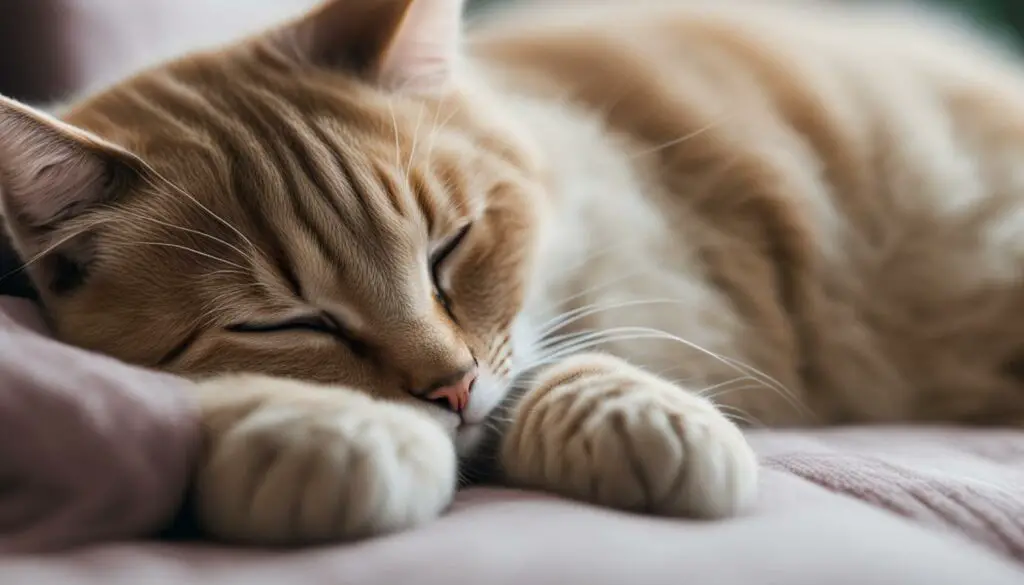
Sleep Disorders and Muscle Tension
When it comes to sleep, cats can experience a variety of disorders that may contribute to muscle tension during sleep. These disorders can range from common issues like nightmares and sleep talking to more serious conditions such as sleepwalking, sleep paralysis, sleep apnea, insomnia, narcolepsy, and hypersomnia.
Nightmares and sleep talking are relatively common among cats and can cause them to become restless during sleep, leading to muscle tension. Sleepwalking, on the other hand, is a less common but still possible sleep disorder that can result in involuntary movements and muscle contractions during sleep. Sleep paralysis, a condition where the cat is temporarily unable to move or speak upon waking up or falling asleep, can also lead to muscle tension as the body becomes stuck in a particular position.
More severe sleep disorders like sleep apnea, insomnia, narcolepsy, and hypersomnia can also cause disrupted sleep patterns and muscle tension. Sleep apnea is characterized by pauses in breathing during sleep, while insomnia refers to the inability to fall asleep or stay asleep. Narcolepsy is a neurological disorder that causes excessive daytime sleepiness and sudden, uncontrollable sleep attacks, which can disrupt normal sleep patterns. Hypersomnia, on the other hand, is a condition that causes excessive sleepiness even after getting enough sleep at night.
These sleep disorders can result from imbalances in neurotransmitters, such as melatonin and serotonin, or disruptions in the body’s circadian rhythm. Melatonin is a hormone that regulates sleep-wake cycles, while serotonin is responsible for mood regulation and sleep quality. When these neurotransmitters are imbalanced or their production is disrupted, it can lead to sleep disorders and muscle tension during sleep.
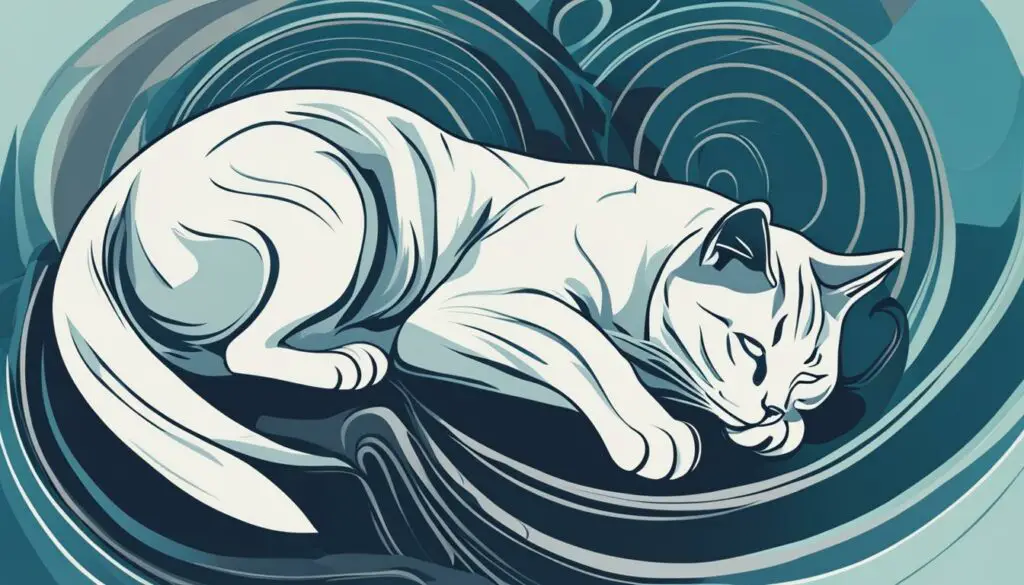
Sleep Disorders and Muscle Tension
Table: Overview of Common Sleep Disorders and their Impact on Muscle Tension
| Sleep Disorder | Symptoms | Impact on Muscle Tension |
|---|---|---|
| Nightmares | Disturbing dreams, restlessness during sleep | Possible muscle tension as a result of disturbed sleep |
| Sleep Talking | Speaking or making sounds during sleep | Possible muscle tension due to increased brain activity |
| Sleepwalking | Involuntary movement and actions during sleep | Possible muscle tension as a result of movement during sleep |
| Sleep Paralysis | Temporary inability to move or speak upon waking up or falling asleep | Possible muscle tension due to being stuck in a particular position |
| Sleep Apnea | Pauses in breathing during sleep | Possible muscle tension as a result of disrupted breathing |
| Insomnia | Difficulty falling asleep or staying asleep | Possible muscle tension due to sleep disturbances |
| Narcolepsy | Excessive daytime sleepiness, sudden sleep attacks | Possible muscle tension due to disrupted sleep patterns |
| Hypersomnia | Excessive sleepiness even after getting enough sleep at night | Possible muscle tension due to disrupted sleep patterns |
It is important to consult with a veterinarian if you suspect that your cat is experiencing sleep disorders and muscle tension during sleep. They can provide a proper diagnosis and recommend appropriate treatment options to alleviate the symptoms and improve sleep quality for your feline companion.
Seeking Veterinary Guidance
| Step | Description |
|---|---|
| 1 | Observation: If you notice that your cat frequently tenses up while sleeping, it is important to closely observe their behavior. Take note of any other symptoms or changes in their sleeping patterns. |
| 2 | Contact a Veterinarian: Reach out to a reputable veterinarian experienced in feline health. Schedule an appointment to discuss your concerns and seek professional guidance. |
| 3 | Physical Examination: During the veterinary visit, your cat will undergo a comprehensive physical examination. The veterinarian will assess their overall health, including muscle tone and any potential underlying conditions. |
| 4 | Diagnostic Tests: Depending on the veterinarian’s initial assessment, further diagnostic tests such as bloodwork, x-rays, or an MRI may be recommended to identify the cause of the muscle tension. |
| 5 | Treatment Plan: Once a diagnosis is made, the veterinarian will develop a customized treatment plan tailored to your cat’s specific needs. This may include medication, physical therapy, or behavior modification techniques. |
In order to address the muscle tension your cat experiences during sleep, seeking veterinary guidance is crucial. Veterinarians have the expertise and resources to properly diagnose the underlying cause and recommend appropriate treatment. Here are the steps to follow:
- Observation: Carefully observe your cat’s behavior and sleeping patterns to gather important information for the veterinary visit.
- Contact a Veterinarian: Reach out to a reputable veterinarian who specializes in feline health and schedule an appointment to discuss your concerns.
- Physical Examination: During the visit, the veterinarian will conduct a thorough physical examination, assessing your cat’s muscle tone and overall health.
- Diagnostic Tests: Depending on the veterinarian’s initial assessment, additional diagnostic tests such as bloodwork, x-rays, or an MRI may be recommended to uncover the cause of the muscle tension.
- Treatment Plan: Once a diagnosis is made, the veterinarian will create a personalized treatment plan tailored to your cat’s specific needs. This may include medications, physical therapy, or behavior modification techniques.
Remember, veterinary guidance is essential for ensuring your cat’s well-being and alleviating any discomfort or pain caused by muscle tension during sleep. The expertise of a veterinarian will help determine the most effective course of action to improve your cat’s sleep quality.
Expert Insight:
“Seeking veterinary guidance is crucial when dealing with any concerning behavior, including muscle tension during sleep. A veterinarian’s expertise and diagnostic tools are invaluable in identifying and addressing the underlying causes, ultimately improving your cat’s overall well-being.” – Dr. Katherine Johnson, DVM
Tips for Improving Sleep Quality in Cats
Ensuring that your cat gets a good night’s sleep is essential for their overall well-being and health. Here are some tips to help improve their sleep quality:
- Create a comfortable environment: Provide your cat with a cozy sleeping area that is free from distractions. Make sure they have a soft and supportive bed or blanket to sleep on.
- Establish a consistent routine: Cats thrive on routine, so try to establish a regular sleep schedule. This means going to bed and waking up at the same time every day. Consistency will help your cat’s body adjust and promote better sleep.
- Focus on nutrition: A well-balanced diet is essential for your cat’s overall health, including their sleep quality. Make sure they are getting the right nutrients and avoid feeding them right before bedtime, as a full stomach can disrupt sleep.
- Promote exercise: Engaging your cat in regular exercise during the day can help burn off excess energy and promote better sleep at night. Playtime and interactive toys are great ways to keep your cat active and mentally stimulated.
Remember, each cat is unique, so it’s important to observe their individual needs and preferences. Experiment with different techniques to see what works best for your feline friend. By creating a comfortable sleep environment, establishing a routine, providing nutritious meals, and encouraging exercise, you can help improve your cat’s sleep quality and ensure that they wake up refreshed and ready to take on the day.
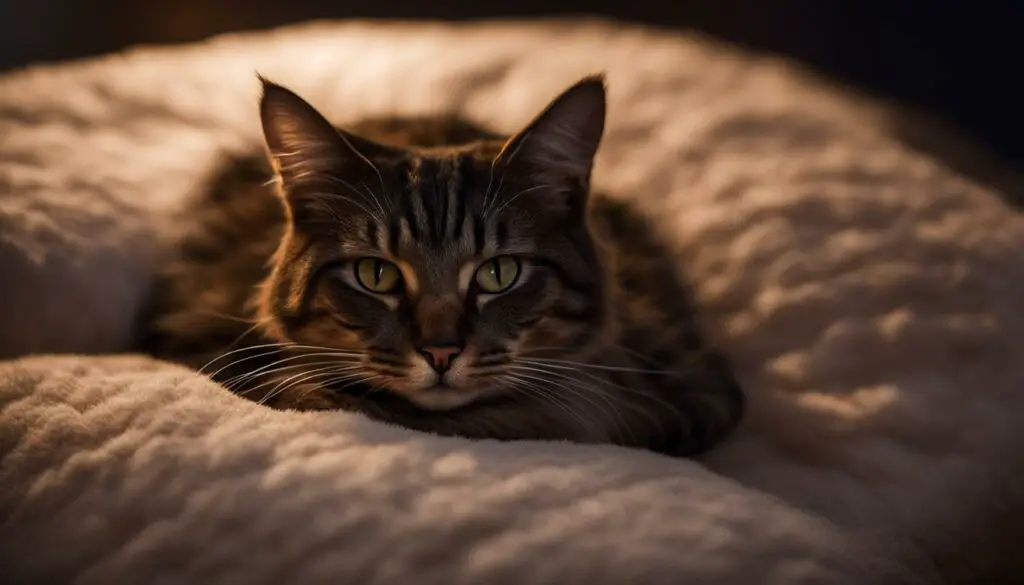
The Importance of Sleep for Cats
Sleep is crucial for cats as it allows them to rest and recuperate both mentally and physically. Adequate sleep promotes overall health and well-being, supporting their immune system, cognitive function, and emotional balance. Cats rely on sleep for various essential functions, making it crucial for their overall quality of life.
Restful sleep plays a vital role in maintaining their mental health. During sleep, cats process information and consolidate memories, allowing them to learn and retain new skills. Lack of sleep can lead to cognitive impairment and affect their ability to navigate their environment effectively.
“Sleep is the golden chain that ties health and our bodies together.” – Thomas Dekker
Furthermore, sleep is essential for cats’ physical health. It allows their bodies to repair and regenerate cells, promoting growth and development. During deep sleep, the body produces growth hormones that aid in tissue repair and strengthening of the immune system. Without sufficient sleep, cats may be more prone to illness and slower recovery times.
| Benefits of Sleep for Cats | Keyword |
|---|---|
| Promotes physical and mental health | health |
| Aids in memory consolidation and learning | memory |
| Supports immune system function | immune system |
| Promotes tissue repair and growth | tissue repair |
As responsible cat owners, it is important to prioritize and ensure that their sleep needs are met. By creating a comfortable and peaceful sleep environment, implementing relaxation techniques, and addressing any muscle tension during sleep, we can help our feline companions achieve optimal sleep quality and overall well-being.
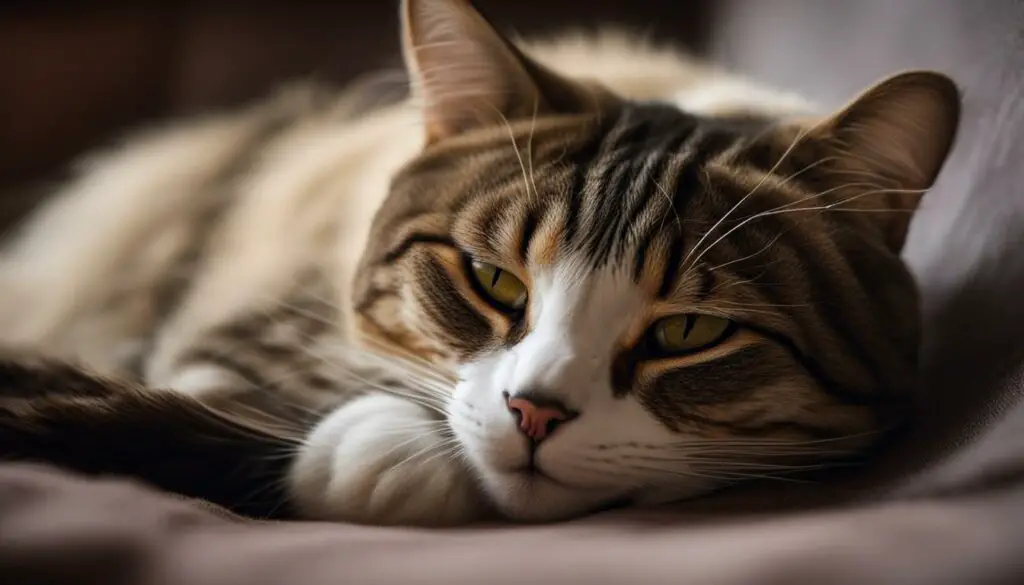
Remember, a well-rested cat is a happy and healthy cat.
Maintaining a Healthy Sleep Environment
Creating a healthy sleep environment for your cat is crucial to ensure restful and rejuvenating sleep. Consider the following factors to provide comfort and promote relaxation:
Temperature:
Keep the sleeping area at a moderate temperature, neither too hot nor too cold. Cats are sensitive to temperature, and extremes can disrupt their sleep. Ensure adequate ventilation and adjust the room temperature if necessary.
Bedding:
Choose comfortable and appropriate bedding for your cat. Soft, cushioned materials like blankets or cat beds provide a cozy and inviting sleep surface. Consider your cat’s preferences and provide options for them to choose what feels most comfortable.
Noise:
Minimize noise disturbances in the sleep environment. Cats are sensitive to sound and may be easily startled or disturbed by loud noises. Place the sleeping area in a quiet part of the house and use soundproofing techniques if needed.
Lighting:
Create a dim and soothing atmosphere in the sleep area. Bright lights can disrupt sleep and make it challenging for cats to relax. Use curtains, blinds, or dimmer switches to control the amount of light in the room and ensure a calm sleep environment.
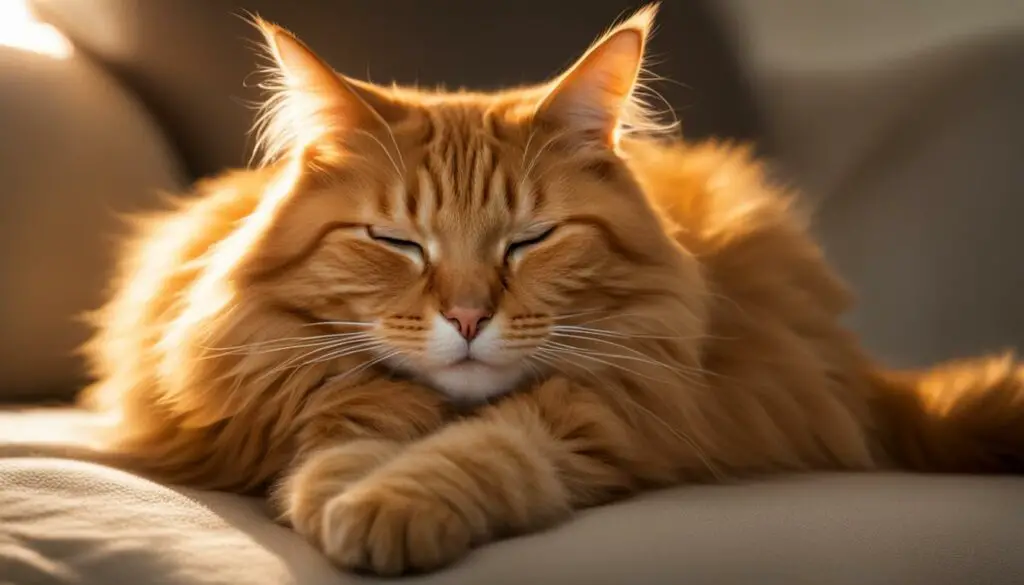
By paying attention to these factors, you can create an ideal sleep environment that promotes comfort and relaxation for your cat. Remember that cats are individuals, so observe their preferences and adjust accordingly to provide the best sleep environment tailored to their needs.
Understanding Your Cat’s Individual Needs
When it comes to ensuring your cat’s sleep quality, understanding their individual needs is essential. Observing their behavior and preferences can provide valuable insights into what helps them relax and feel safe. By tailoring their sleep environment and routine accordingly, you can create a conducive space for them to unwind and get the rest they need.
Every cat has unique preferences when it comes to sleep. Some may prefer a cozy bed in a quiet corner, while others may enjoy stretching out on a soft blanket in a sunlit spot. Pay attention to where your cat chooses to sleep and take note of the conditions that seem to help them relax the most. Providing a comfortable and secure sleeping area can contribute to better sleep quality and reduce muscle tension.
In addition to the physical environment, consider your cat’s emotional needs. Cats are known for their independent and solitary nature, and respecting their personal space is crucial. Ensure they have quiet and uninterrupted sleep time, free from disturbances such as loud noise or bright lights. Creating a calm and peaceful atmosphere can help promote relaxation and minimize muscle tension.
Lastly, remember that each cat is an individual, and their preferences may change over time. What works for one cat may not work for another. Stay attentive to their cues and be flexible in adjusting their sleep environment and routine as needed. By understanding and meeting your cat’s unique needs, you can help eliminate muscle tension during sleep and create a harmonious sleep environment.
Conclusion
In conclusion, understanding why your cat tenses up while sleeping is essential for their overall well-being. Cats may experience muscle tension during sleep due to various factors, including stress, anxiety, environmental triggers, sleep disorders, or natural reflexes. By observing your cat’s behavior and seeking veterinary guidance when necessary, you can ensure that their sleep quality is optimized.
Creating a calm and soothing sleep environment, maintaining a consistent routine, and providing appropriate nutrition and exercise can also contribute to better sleep for your feline companion. Remember, each cat is unique, so it’s important to observe their individual needs and tailor their sleep environment accordingly.
Sleep plays a vital role in your cat’s physical and mental health, allowing them to rest, recover, and maintain their overall well-being. By addressing any muscle tension during sleep, you are promoting optimal sleep quality, supporting their immune system, cognitive function, and emotional balance.
So, pay attention to your cat’s sleeping habits, create a healthy sleep environment, and seek professional guidance when needed. By doing so, you can ensure that your furry friend enjoys a restful and rejuvenating sleep each night.
FAQ
Why does my cat tense up while sleeping?
Cats may tense up while sleeping due to muscle contractions during certain sleep stages. This behavior can be normal and is often associated with dreaming or maintaining muscle tone. However, excessive or frequent muscle tension may indicate an underlying issue and should be evaluated by a veterinarian.
What causes muscle tension in cats during sleep?
Muscle tension in cats during sleep can be caused by various factors, including stress, anxiety, changes in the environment, or natural reflexes. It is important to observe your cat’s behavior and determine any potential triggers or underlying health concerns that may be contributing to their muscle tension.
How does the feline sleep cycle impact muscle tension?
Cats go through different sleep stages, including REM sleep and deep sleep. During REM sleep, cats may experience twitches or muscle contractions, which can contribute to muscle tension. Understanding the sleep cycle can help explain why cats tense up while sleeping and how it relates to their overall sleep quality.
What is the role of muscle tone in cat sleep?
Maintaining muscle tone is important for cats’ sleep quality. Tensing up during sleep can help prevent muscle atrophy and promote overall muscle health. However, excessive muscle tension during sleep can disrupt sleep patterns and may indicate underlying discomfort or pain.
How do environmental factors influence muscle tension in cats?
Cats are instinctual creatures and may naturally tense up while sleeping as a response to potential predators or prey. Environmental factors such as noise, bright lights, or uncomfortable temperatures can trigger this response, leading to muscle tension during sleep. Creating a calm and soothing sleep environment can help alleviate muscle tension.
What relaxation techniques can help reduce muscle tension in cats during sleep?
Gentle massage, stretching exercises, creating a calm sleep environment, and introducing meditation techniques can help promote relaxation and reduce muscle tension in cats during sleep. These techniques can help your cat feel more comfortable and relaxed before bedtime.
Can sleep disorders cause muscle tension in cats?
Yes, sleep disorders such as nightmares, sleepwalking, sleep talking, sleep paralysis, sleep apnea, insomnia, narcolepsy, and hypersomnia can disrupt cats’ sleep patterns and contribute to muscle tension. These disorders often stem from imbalances in neurotransmitters or disruptions in the body’s circadian rhythm.
When should I seek veterinary guidance for my cat’s muscle tension during sleep?
If you are concerned about your cat’s muscle tension during sleep, it is best to consult with a veterinarian. They can perform a thorough examination and diagnostic tests to determine the underlying cause of the muscle tension. This will help ensure your cat’s health and well-being.
How can I improve my cat’s sleep quality?
To help improve your cat’s sleep quality, you can make adjustments to their sleep environment and daily routine. Provide a comfortable sleeping area, establish a consistent sleep schedule, offer a well-balanced diet, engage your cat in regular exercise, and create a calm and peaceful atmosphere for sleep.
Why is sleep important for cats?
Sleep is crucial for cats as it allows them to rest and recuperate both mentally and physically. Adequate sleep promotes overall health, supports their immune system, cognitive function, and emotional balance. Providing a quality sleep environment can help ensure your cat gets the rest they need.
How can I create a healthy sleep environment for my cat?
To create a healthy sleep environment for your cat, provide a comfortable sleeping area with suitable bedding. Ensure the temperature is moderate, minimize noise and bright lighting to create a calm and peaceful atmosphere that encourages relaxation.
How can I understand my cat’s individual sleep needs?
Pay attention to your cat’s behavior and preferences when it comes to sleep. Observe what helps them relax and feel safe, and tailor their sleep environment and routine to their specific needs. Understanding your cat as an individual will help create a sleep-friendly environment.

